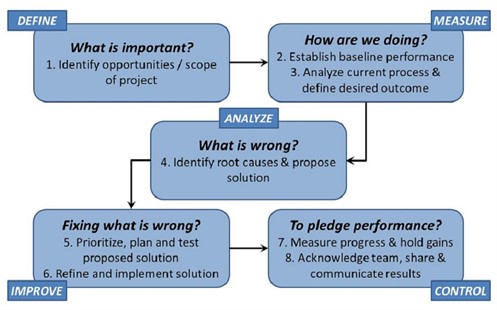- Home
- Solutions
- Business Process
- Business Process Improvement
BUSINESS PROCESS IMPROVEMENT
What Does This Solution Do?
|
Desai’s Business Process Improvement (BPI) Solution provides a collection of formal and flexible methods, including Lean, SixSigma, etc., to identify the root cause of problems, the degree of non-compliance, and recommended improvements, resulting in rapid problem fixes and enabling continuous process improvement. Desai’s approach to BPI focuses on establishing a culture of continuous improvement through adoption of Lean principles. Desai’s staff and solutions help customers identify variation and/or waste in processes, and then help reduce or eliminate it, so that the desired outcome can be achieved with better utilization of resources. |
|
 |
Desai’s BPI solution works by helping to:
- Define the customer’s strategic goals and purposes (Who we are, what do we do, and why do we do it?)
- Determine the organization’s customers (or stakeholders) (Who do we serve?)
- Align the customer’s business processes to realize the organization’s goals (How do we do it better?)
Desai’s BPI solution is built around a general eight-step method for problem solving, which has wide applicability, but is especially appropriate for BPI.
Our experienced team includes Lean and SixSigma practitioners who will work closely with your staff to follow these methods and ensure that the key considerations in any "improvement" effort are understood and pursued to realization.
What Deliverables Are Produced For The Customer?
Desai’s approach to BPI is done in conjunction with the rigors of Business Process Management (BPM), as defined by the IIBA BABOK. Successful deployment of their BPI solution, in partnership with customer staff, can lead to initial and ongoing process improvement and management. Key outcomes enabling long-term success can include:
- Implementation of ongoing process performance monitors tied to customer-driven process measures
- Process certification (ensuring it meets a set of effectiveness criteria)
- Appointment of a formal process owner who is responsible for process performance on an ongoing basis
- Management commitment that the process has a plan and budget
What Benefits Does It Provide To Customers?
The core objectives of any BPI solution are to eliminate waste, improve turnaround time for customer goods and services, reduce defect levels, and thus increase the customer’s overall output (e.g., “# pieces”). Desai’s BPI staff and solution pursue these objectives by focusing on supporting benefits and improvements as follows:
Improving customer process alignment with business goals. The customer’s strategic goals provide the key direction for any BPI exercise. Desai’s experienced staff helps ensure such alignment by incorporating appropriate strategic measures into the BPI initiative (e.g., Balanced Scorecard). Desai’s Framework for Strategy Execution (FSE) helps identify business metric areas for consideration. Doing so helps ensure that BPI projects are identified and prioritized in the context of the customer’s overall strategy agenda.
Attaching the appropriate customer focus to BPI efforts. Customers often fail to understand that their needs can change quickly, which underscores the importance of aligning business processes to achieve higher customer satisfaction. Desai’s experience has shown that it’s imperative in any BPI exercise to know and include the “voice of the customer” when reviewing or redesigning any process.
Educating customers on the importance of benchmarks. Most BPI methods place great emphasis on measurable results. Because of this, benchmarks play an important role in BPI. Desai staff works with the customer to understand the lifecycle of the process in question, to help choose and apply appropriate benchmarks. Benchmarks may be internal (within the organization), external (from other competing/noncompeting organizations, such as standards’ bodies), legal or regulatory mandates, or dictates by the senior management of the organization as targets to aim for.
Helping customers establish process owners. Desai’s experience is that for any process to be controllable, it’s mandatory to be clear about who the process owners are, as well as what will constitute success or failure of the process as it executes. By helping define specific success/failure levels, Desai helps the customer establish “control limits” for the process and enable an ongoing determination of whether a process is meeting the desired objectives.
Desai’s BPI solution and experience can help customers successfully identify underachieving processes as well as a roadmap for improvement. Let’s get to work.
